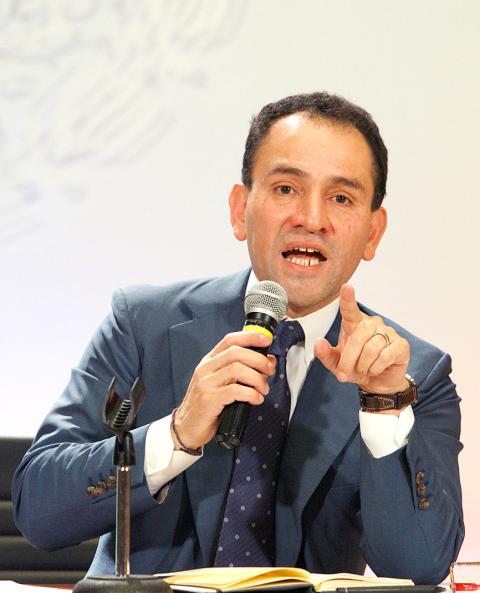New Mexican Minister of Finance Arturo Herrera on Tuesday vowed to extend the tight fiscal grip exerted by his predecessor, moving to restore calm after the stormy departure of his former boss from the Cabinet of Mexican President Andres Manuel Lopez Obrador.
Mexico would not stray from a commitment to run a primary budget surplus of 1 percent set by former minister Carlos Urzua and would probably set a similar target for next year, Herrera said.
“The most important anchor point of fiscal policy for this year is a primary surplus of 1 percent,” he said. “It’s most likely that for next year we will have a similar number.”

Photo: AFP
Budget parameters would be presented on Sept. 8, he added.
Urzua resigned on Tuesday with a letter that shocked Mexico, as well as investors around the world.
A self-declared moderate, Urzua blamed his exit on policy “extremism,” unspecified conflicts of interest among high officials, uninformed policymaking and interference in ministry appointments.
Urzua’s commitment to fiscal discipline was seen as a bright spot in Lopez Obrador’s administration, which has rattled investor confidence with abrupt moves against business interests in major infrastructure projects.
By naming Urzua’s protege, Herrera, to the top job within an hour of the former’s resignation, Lopez Obrador stemmed a sell-off in Mexican assets that saw the peso fall as much as 2 percent and the stock market drop 1.4 percent.
Seeking to further soothe nerves, Herrera said that he did not think Mexico’s first-quarter economic contraction would herald a recession.

SELL-OFF: Investors expect tariff-driven volatility as the local boarse reopens today, while analysts say government support and solid fundamentals would steady sentiment Local investors are bracing for a sharp market downturn today as the nation’s financial markets resume trading following a two-day closure for national holidays before the weekend, with sentiment rattled by US President Donald Trump’s sweeping tariff announcement. Trump’s unveiling of new “reciprocal tariffs” on Wednesday triggered a sell-off in global markets, with the FTSE Taiwan Index Futures — a benchmark for Taiwanese equities traded in Singapore — tumbling 9.2 percent over the past two sessions. Meanwhile, the American depositary receipts (ADRs) of Taiwan Semiconductor Manufacturing Co (TSMC, 台積電), the most heavily weighted stock on the TAIEX, plunged 13.8 percent in

A wave of stop-loss selling and panic selling hit Taiwan's stock market at its opening today, with the weighted index plunging 2,086 points — a drop of more than 9.7 percent — marking the largest intraday point and percentage loss on record. The index bottomed out at 19,212.02, while futures were locked limit-down, with more than 1,000 stocks hitting their daily drop limit. Three heavyweight stocks — Taiwan Semiconductor Manufacturing Co (TSMC, 台積電), Hon Hai Precision Industry Co (Foxconn, 鴻海精密) and MediaTek (聯發科) — hit their limit-down prices as soon as the market opened, falling to NT$848 (US$25.54), NT$138.5 and NT$1,295 respectively. TSMC's

TARIFFS: The global ‘panic atmosphere remains strong,’ and foreign investors have continued to sell their holdings since the start of the year, the Ministry of Finance said The government yesterday authorized the activation of its NT$500 billion (US$15.15 billion) National Stabilization Fund (NSF) to prop up the local stock market after two days of sharp falls in reaction to US President Donald Trump’s new import tariffs. The Ministry of Finance said in a statement after the market close that the steering committee of the fund had been given the go-ahead to intervene in the market to bolster Taiwanese shares in a time of crisis. The fund has been authorized to use its assets “to carry out market stabilization tasks as appropriate to maintain the stability of Taiwan’s

In a small town in Paraguay, a showdown is brewing between traditional producers of yerba mate, a bitter herbal tea popular across South America, and miners of a shinier treasure: gold. A rush for the precious metal is pitting mate growers and indigenous groups against the expanding operations of small-scale miners who, until recently, were their neighbors, not nemeses. “They [the miners] have destroyed everything... The canals, springs, swamps,” said Vidal Britez, president of the Yerba Mate Producers’ Association of the town of Paso Yobai, about 210km east of capital Asuncion. “You can see the pollution from the dead fish.